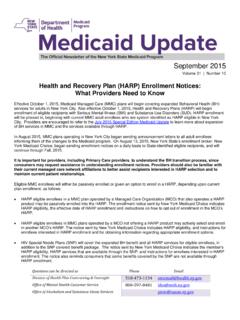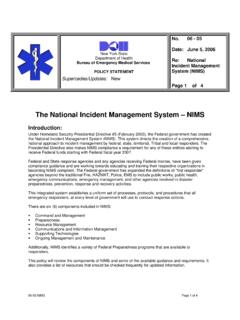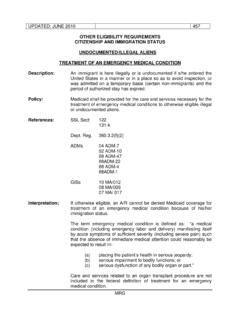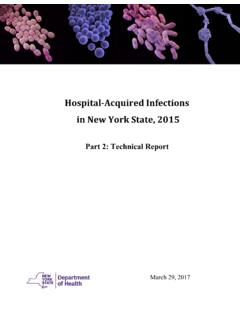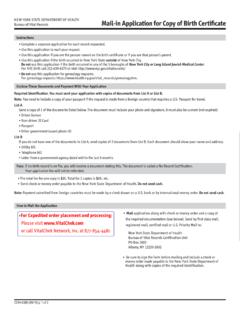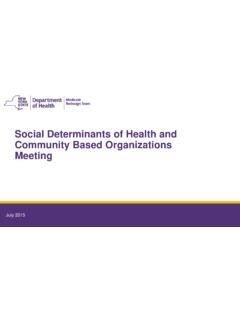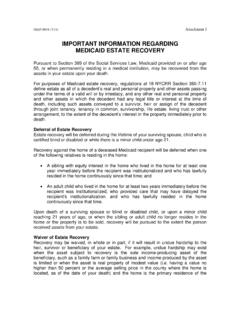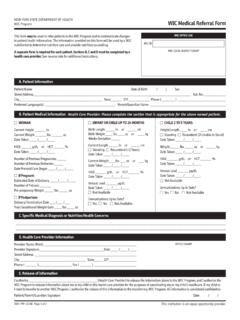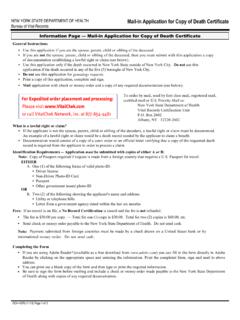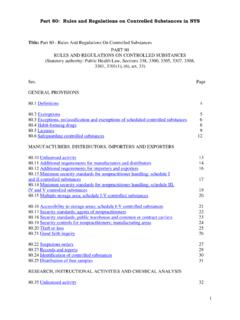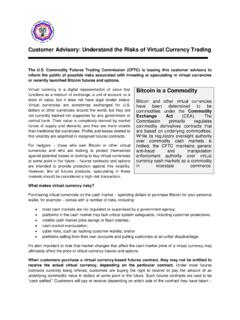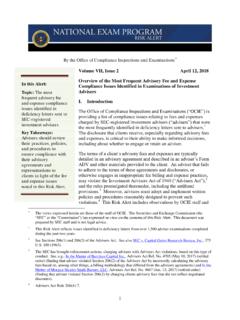Transcription of HEALTH ADVISORY: RECOMMENDATIONS FOR …
1 September 2016 To: HEALTH Care Facilities, Local HEALTH Departments (LHDs), Providers From: New york State department of HEALTH , Bureau of Immunization HEALTH advisory : RECOMMENDATIONS FOR VACCINATION OF HEALTH CARE PERSONNEL (HCP) Please distribute to the Employee HEALTH Service, Infection Control department , Infectious Disease department , Nursing Director and Medical Director. SUMMARY This advisory summarizes those immunizations that are required for HEALTH care personnel (HCP) according to the New york State Public HEALTH Law (PHL) and New york Codes, Rules and Regulations (NYCRR). It also discusses RECOMMENDATIONS of the Occupational Safety and HEALTH Agency (OSHA), advisory Committee on Immunization Practices (ACIP), the Healthcare Infection Control Practices advisory Committee (HICPAC), and the Joint commission concerning the use of immunizations in the HEALTH care setting.
2 The New york State department of HEALTH (NYSDOH) and New york City department of HEALTH and Mental Hygiene (NYCDOHMH) strongly recommend protecting HCP and the patients they care for by promoting HCP vaccination initiatives. Maintenance of immunity is an essential part of prevention and infection prevention programs for HCP including, but not limited to, physicians, nurses, aides, respiratory therapists, radiology technicians, students (medical, nursing, and others), emergency medical personnel, dentists, social workers, chaplains, volunteers, and dietary, housekeeping and clerical workers. Updates to the previous 2007 advisory include RECOMMENDATIONS for testing for proof of immunity for measles, mumps, rubella, varicella and hepatitis B; information regarding new influenza prevention regulations related to HCP and current ACIP RECOMMENDATIONS for vaccination of HCP against tetanus, diphtheria, pertussis and meningococcal meningitis.
3 BACKGROUND HCP are at risk for exposure to and are able to transmit vaccine-preventable diseases because of their contact with patients or infective material from patients. HCP include not only physicians, nurses and emergency medical personnel, but also those who have any contact with patients or materials used by patients, such as dental professionals, students, respiratory therapists, radiology personnel, social workers, chaplains, volunteers, and dietary, housekeeping and 2 clerical workers. Maintenance of immunity is an essential part of prevention and infection control programs for HCP. Although only some vaccines are required for HCP, the NYSDOH and NYCDOHMH strongly recommend that all HEALTH care facilities protect HCP and the patients or residents they care for by promoting all ACIP recommended vaccines.
4 It has been demonstrated that HCP are vectors for the spread of communicable diseases to patients who are most vulnerable to complications and death. HCP vaccination helps to protect patients from these vaccine-preventable diseases and decreases patient morbidity and mortality. Vaccination against communicable diseases protects HCP by reducing or eliminating the spread of serious diseases and saves employees and employers money by reducing the need for medical visits, missed days of work due to illness, productivity loss, and medical errors committed by HCP working while ill. Vaccines are a cost-effective benefit and provide a safer environment for employees and patients.
5 Although HEALTH care organizations may be concerned about the cost of vaccinating their employees, the costs of not doing so are much higher. The RECOMMENDATIONS and requirements summarized in this advisory can assist hospital administrators, infection prevention practitioners, employee HEALTH staff, and HCP in optimizing infection prevention and control programs. Background information for each vaccine-preventable disease and specific RECOMMENDATIONS for the use of each vaccine may be found on the ACIP website at: VACCINE REQUIREMENTS Measles, Mumps, Rubella (MMR) All persons who work in HEALTH care facilities are required to be immune to measles and rubella according to New york State (NYS) regulations.
6 It is also recommended that HCP be immune to mumps. Receipt of 2 documented doses of MMR vaccine, given on or after the first birthday and separated by at least 28 days is proof of immunity to measles, mumps, and rubella. No serologic testing is required or recommended to confirm immunity. The NYSDOH, NYCDOHMH and CDC strongly discourage serologic testing when the complete measles, mumps and rubella vaccine history is available. o Documented age-appropriate vaccination supersedes the results of subsequent serologic testing. o If a person who has 2 documented doses of measles- or mumps-containing vaccines is tested serologically and is determined to have negative or equivocal measles or mumps titer results, it is not recommended that the person receive an additional dose of MMR vaccine.
7 Such persons should be considered to have presumptive evidence of immunity. Persons born in 1957 or later can be considered immune to measles, mumps, or rubella only if they have documentation of either: o Two doses of live measles and mumps vaccines administered on or after the first birthday and separated by at least 28 days, and at least one dose of live rubella vaccine administered on or after the first birthday; OR 3 o Laboratory evidence of measles, mumps, or rubella immunity. Persons who have an indeterminate or equivocal level of immunity upon testing should be considered susceptible if no documentation of vaccination is available.
8 O Note: although, according to NYS regulations, diagnosis of measles disease by a physician, nurse practitioner, or a physician s assistant is allowed as evidence of immunity, NYSDOH, NYCDOHMH and CDC recommend that HEALTH care facilities discontinue allowing employees born after 1957 to claim immunity to measles and mumps based on HEALTH care provider diagnosis alone. HEALTH care provider diagnosis of rubella has never been permitted as evidence of immunity. Unless the employee has 2 documented doses of a measles-containing vaccine and one documented dose of a rubella-containing vaccine, serologic testing should be done to confirm measles and rubella immunity.
9 Persons born before 1957: o Have acceptable presumptive evidence of measles and mumps immunity; o Birth before 1957 is not considered evidence of immunity against rubella for HCP and women who could become pregnant. Persons born before 1957 must have either one dose of live rubella vaccine administered on or after the first birthday or laboratory evidence of rubella immunity. o In addition, it is recommended that two doses of MMR vaccine be given to unvaccinated HCP born before 1957 without laboratory confirmation of measles and mumps disease or laboratory evidence of measles and mumps immunity. For HCP who do not have evidence of immunity, 2 doses of MMR vaccine are recommended during a measles or mumps outbreak, and one dose during an outbreak of rubella.
10 For more information on NYS regulations regarding immunity to measles and rubella, please refer to NYCRR Title 10, Sections (hospitals), (nursing homes), (diagnostic and treatment centers), and (home HEALTH agencies and programs), and (hospices). These regulations can be found at For more information on updated RECOMMENDATIONS for measles, mumps and rubella immunity, please see the June 14, 2013 MMWR entitled, Prevention of Measles, Rubella, Congenital Rubella Syndrome, and Mumps, 2013 Summary: RECOMMENDATIONS of the ACIP available at: VACCINE RECOMMENDATIONS Varicella It is recommended that all HCP be immune to varicella.
